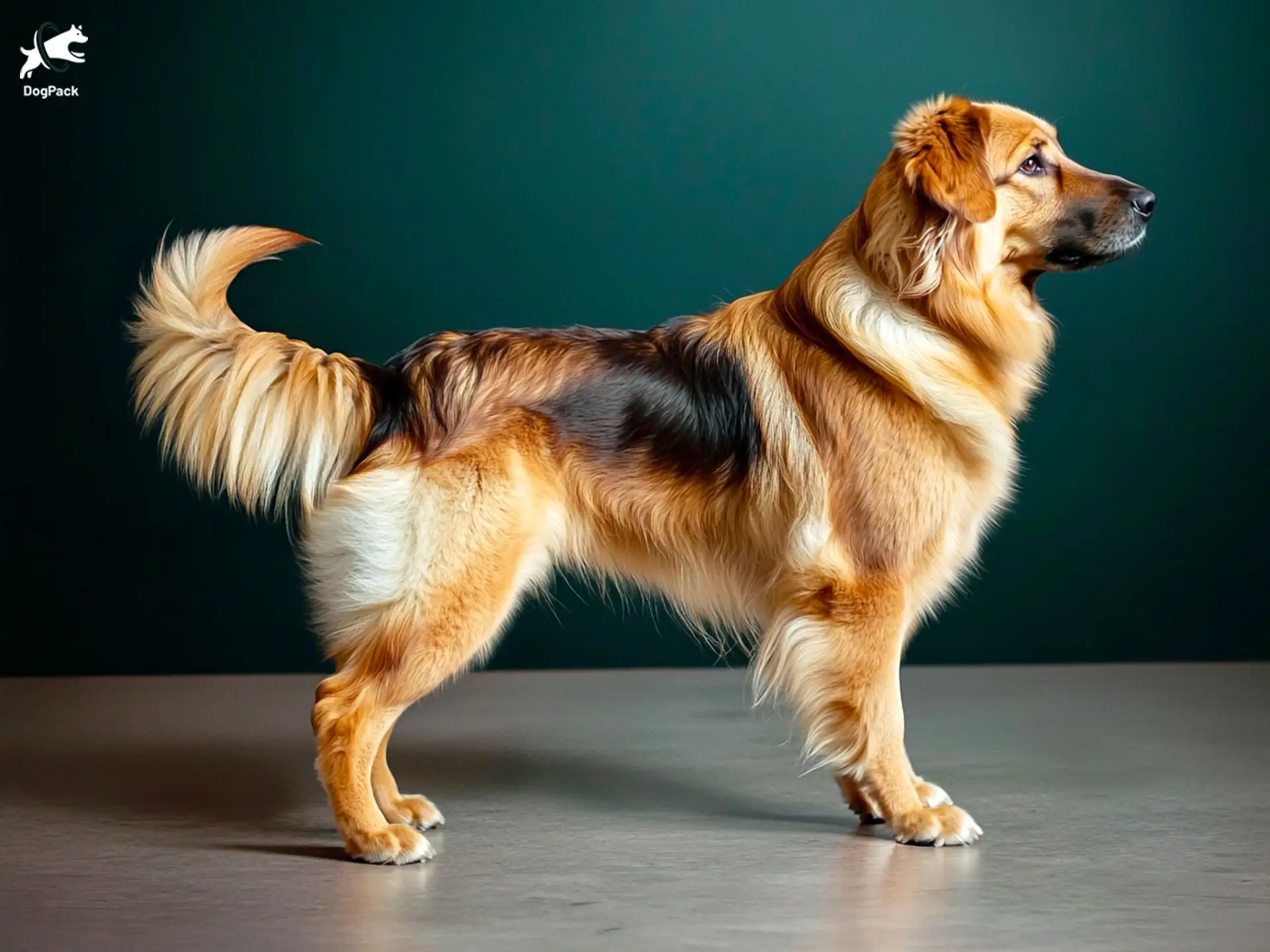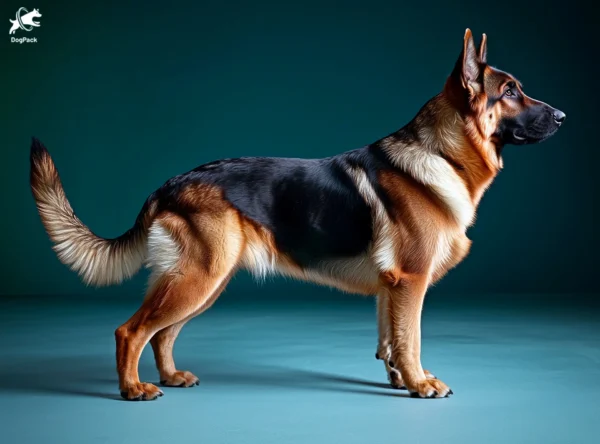Golden Shepherd Dog Breed Info & Overview
The Golden Shepherd, a dynamic mix of the devoted German Shepherd and the affectionate Golden Retriever, is a loyal and intelligent companion. This energetic hybrid thrives in active households, blending the Golden’s playful charm with the Shepherd’s protective instincts. With a gentle yet vigilant nature, the Golden Shepherd is an ideal choice for families seeking both companionship and security.
Characteristics
Pictures
Breed History
This cross traces its roots to the late 20th century, when breeders sought to merge the steadfast loyalty of the German Shepherd with the easygoing charm of the Golden Retriever. The German Shepherd originated in Germany as a herding and working dog, while the Golden Retriever hails from the Scottish Highlands, famed for skilled retrieval during hunting.
By blending these two distinct backgrounds, enthusiasts hoped to create a versatile companion with intelligence and an amiable demeanor. Early litters consistently showcased dogs that excelled at tasks like family guardianship, obedience, and even therapy work. With such promise, this purposeful mix gained traction among those who craved an adaptable, robust friend. It stood out among large dog breeds for its balanced combination of working ability and a gentle temperament.
Although not officially recognized by major kennel clubs, many people embrace the unique traits of this cross. Some fans call it the Golden Shepherd, reflecting the balanced representation of each parent breed. Over time, passionate owners formed dedicated communities and registries to celebrate their dogs’ distinctive lineage, ensuring that this modern hybrid continues to thrive for generations to come.
Temperament, Personality
These dogs typically inherit a sweet disposition from the Golden side, balanced by the alertness and protective instincts of the Shepherd side. They’re known to form strong bonds with their families, often showcasing unwavering loyalty. When well-socialized, they get along splendidly with children, other pets, and even strangers—though they might remain cautious until fully comfortable.
Beneath that confident exterior, there’s usually a playful, sometimes goofy side just waiting to emerge. Many owners find them rummaging through toy baskets or bounding around the yard, eager for any game that engages both mind and body. That inherent eagerness to please can make these pups quite entertaining, whether they’re chasing a tennis ball or mastering new tricks.
Despite their loving nature, it’s wise to introduce structure early on, as these dogs can become overly protective if they sense a threat. Proper boundaries help channel that loyal spirit into positive interactions. The Golden Shepherd typically displays a fine balance: enough vigilance to safeguard its home but still gentle enough to be everyone’s best friend.
Physical Characteristics
These pups usually present a muscular build, inheriting the Shepherd’s sturdy frame and the Retriever’s softer lines. Most have a broad head with slightly tapered muzzles and expressive, almond-shaped eyes. Ears can vary—some remain floppy like a Golden’s, while others stand erect, reflecting that strong German Shepherd influence. That mix often results in a strikingly athletic appearance.
Coat textures also vary widely, from the dense double coat seen in Shepherds to the wavy, feathered type common in Golden Retrievers. Colors can include shades of gold, black, tan, and even cream or mahogany. Regardless of specific coloration, these dogs frequently sport a lush, medium-length coat that offers moderate protection against the elements.
Though classified as a large hybrid, the Golden Shepherd doesn’t typically reach the massive stature of giant breeds. Still, they can weigh up to 75 pounds and measure around two feet at the shoulder, making them a strong presence. This substantial size, paired with their lively spirit, means they can fill a backyard—and a heart—in no time.
Health Issues
Hip and elbow dysplasia frequently appear in larger canines, and these pups are no exception. Regular vet visits and weight management can help minimize the impact of these joint problems. Screening parent dogs for orthopedic issues is a good starting point for new owners, ensuring they’re aware of possible hereditary conditions within their future companion’s lineage.
Golden Retrievers are known for a higher risk of certain cancers, which sometimes carries over to their mixed offspring. While this doesn’t guarantee problems, vigilance is crucial—regular checkups and prompt attention to unusual lumps or lethargy can make a big difference. Heart issues also crop up from time to time, underscoring the need for annual cardiac evaluations.
A well-rounded preventative plan supports long-term wellness in the Golden Shepherd. This includes scheduling routine blood work, maintaining a balanced diet, and paying attention to any changes in mobility. Working closely with a trusted veterinarian helps catch potential challenges early, giving your buddy the best shot at a healthy life filled with active play and cherished moments.
Grooming Needs
Those luxurious coats typically demand a fair bit of upkeep, especially during seasonal shedding. Brushing a few times a week helps remove loose fur before it finds its way onto your couch or carpets. A slicker brush or pin brush works wonders, and an occasional deshedding tool can reduce fluff accumulation around the house.
Bathing every six to eight weeks is generally sufficient unless your furry friend rolls in something especially pungent. Frequent baths may strip natural oils, leading to dry skin and potential irritation. When you do suds up, opt for a gentle shampoo formulated for dogs, ensuring you keep their coat shiny without compromising its protective qualities.
Trimming nails, checking ears for debris, and brushing teeth should round out your routine. Because the Golden Shepherd has floppy or partially erect ears, keep an eye on any redness or odor that might signal infection. Regular maintenance ensures your canine companion not only looks sharp but also stays healthier in the long run.
Exercise Requirements
High energy levels mean these pups flourish with ample daily activity. Extended walks, jogs, or play sessions help them burn off steam. Without consistent outlets for their vigor, they might resort to chewing furniture or digging holes in the yard. If you’re looking for a running buddy, these dogs often fit the bill perfectly. Like other working dog breeds, they relish tasks that engage both body and mind.
Mental stimulation is equally crucial. Games like hide-and-seek, puzzle feeders, or even basic scent work keep that intelligent mind busy. Owners often find that a bored Golden-Shepherd mix becomes crafty—like figuring out how to open doors or rummage through cabinets in search of snacks! Scheduled playdates or doggy daycare visits can also satisfy their need for social interaction.
Aim for at least an hour of vigorous exercise each day, spread between morning and evening. If your schedule permits, an agility class or advanced obedience training can keep them mentally challenged, too. The Golden Shepherd thrives when offered variety, so switch up activities whenever possible, whether it’s a swim session, a scenic hike, or a backyard obstacle course.
Training Tips
Consistency and patience go a long way in shaping these bright canines. Since they’re eager to please, reward-based methods such as treats or praise can accelerate learning. Positive reinforcement keeps them motivated, while harsh corrections may lead to anxiety or defiance. Start basic commands early to foster good habits—puppies absorb lessons surprisingly fast.
Obedience classes can help you navigate any early hurdles, especially if you’re new to training. Under the guidance of a professional, these dogs quickly grasp correct behaviors. Socialization is equally critical—exposing them to various sights, sounds, and people ensures they grow into well-rounded adults who don’t startle easily. In many cases, group classes double as social outings.
When faced with stubborn streaks, avoid losing your cool. Gentle firmness often yields the best results. Because the Golden Shepherd can be protective, teach appropriate greeting manners to prevent over-guarding. Provide consistent cues and environments, rewarding any positive interactions. Over time, you’ll watch a playful, intelligent pup blossom into a well-adjusted companion who’s ready for life’s adventures.
Nutrition, Diet
Because these dogs can weigh between 50 and 75 pounds, they need a nutrient-dense diet that supports muscle maintenance and joint health. Look for kibble formulated for large breeds with moderate protein levels—around 22% to 26%—and a balance of healthy fats. Quality ingredients like real chicken, salmon, or lamb as the first ingredient generally indicate a more premium product.
The average adult Golden-Shepherd mix may consume between 2.5 to 3.5 cups of dry food daily, split into two meals to prevent bloat. Busy or highly active adults might require slightly more, while a more sedentary lifestyle might warrant cutting back. Monitoring your dog’s weight and adjusting portions accordingly helps maintain an ideal body condition and overall health.
For puppies, consider specially formulated large-breed puppy food with controlled calcium levels to support proper skeletal growth. The Golden Shepherd typically matures by 18 to 24 months, so consult your vet before switching to adult formulas. Always have fresh water available, and watch out for table scraps or excessive treats, as extra calories can quickly add up to unwanted pounds.
Adoption, Breeders
Finding a Golden Shepherd puppy often starts with checking local shelters or breed-specific rescue groups. Because these dogs are a mix, you might discover them listed under either parent breed. Many rescue organizations, like German Shepherd Rescue and Adoptions, occasionally have Golden mixes looking for the perfect home. Visiting in person helps gauge temperament and compatibility.
Should you prefer going through a breeder, research carefully to avoid puppy mills. Responsible breeders provide health clearances, allow kennel visits, and offer insights into each puppy’s lineage. Some might specialize in Shepherd-Golden crosses, but make sure they follow ethical breeding practices. The Golden Shepherd FB Group is a helpful resource for recommended breeders and detailed breed information.
While searching, inquire about any health guarantees or return policies, which often indicate a reputable operation. A good relationship with your breeder or rescue can be invaluable when you have questions. Always confirm vaccination records and consider microchipping. Giving a Golden Shepherd a forever home not only enriches your life but also provides a loyal companion who thrives with love.
Family Pet?
Families seeking an affectionate yet protective dog often find this mix an ideal choice. Their patient demeanor makes them generally good with children, provided youngsters learn respectful interaction. Since they bond closely with their household, these canines relish group activities like backyard fetch or weekend hikes. Setting consistent rules prevents confusion, especially if little ones want to help train.
Early socialization is essential to ensure they don’t become overly wary of newcomers. Introduce them to friendly neighbors, playful cousins, and even calm cats during puppyhood so they learn appropriate boundaries. Most behave kindly if taught gentle interactions, but keep an eye on rowdy play, as their size and enthusiasm can occasionally overwhelm smaller family members.
Thanks to their adaptability, a Golden Shepherd typically thrives in homes that offer engagement and companionship. Whether it’s joining a soccer game in the backyard or curling up by the couch, they’ll be where the action is. With consistent guidance and plenty of love, they can grow into fantastic family pets, devoted to everyone under the same roof.
Right For You?
Before bringing one home, consider whether you can accommodate a dog that craves daily exercise and mental challenges. A fenced yard or nearby park is ideal for letting them blow off steam. If you’re frequently away or live in a small apartment, you’ll need to ensure enough outlets for their pent-up energy through dog walkers, puzzle toys, or doggy daycare.
Budgeting for grooming, high-quality food, and routine vet checkups is another crucial consideration. Their thick coats mean you’ll invest in brushes and perhaps a decent vacuum. Veterinary care for joint checks, possible allergies, or other concerns can also add up. Still, many owners find the devotion and protection they receive in return well worth the investment.
Ultimately, the Golden Shepherd suits individuals or families committed to providing structure and interaction. If you love outdoor adventures, want a loyal companion, and don’t mind occasional fur tumbleweeds, this energetic mix might be the perfect match. Make sure everyone in the household is on board and prepared for an active, playful dog that returns your affection tenfold.
Conclusion
The Golden Shepherd stands out as a versatile, family-oriented companion that blends the intelligence of a German Shepherd with the gentle spirit of a Golden Retriever. From active households with kids to dedicated individuals craving a loyal partner for outdoor pursuits, this mix has something to offer just about everyone. If you’re ready to provide ample exercise, loving guidance, and the right social environment, you’ll be rewarded with a devoted, playful friend who thrives on being part of the family. With proper care and attention, your furry companion can enjoy a long, healthy life filled with countless wagging-tail moments. Before you know it, you’ll wonder how you ever lived without this wonderful hybrid.
FAQs
-
Why do Golden Shepherds tend to stay close to their owners?
Golden Shepherds inherit strong loyalty and attachment from both their German Shepherd and Golden Retriever parents. This makes them highly velcro dogs, meaning they prefer to stay close to their owners at all times and may even follow them from room to room.
-
Why does my Golden Shepherd carry objects around the house?
Golden Shepherds often display a natural instinct to carry things in their mouth, inherited from the Golden Retriever’s retrieving background. They may grab toys, shoes, or even household objects as a way to self-soothe, get attention, or express excitement.
-
Why does my Golden Shepherd “herd” family members or other pets?
Golden Shepherds may nudge, circle, or gently push people or animals due to the herding instincts inherited from their German Shepherd lineage. This behavior is most common in puppies and young adults, and early training helps prevent excessive herding.
-
Why does my Golden Shepherd tilt its head when I talk?
Golden Shepherds tilt their heads as a way to focus on sounds and process speech patterns. This behavior is believed to be a sign of high intelligence and attentiveness, as they are trying to understand commands, emotions, or recognize familiar words.
-
Why does my Golden Shepherd have bursts of hyperactivity?
Golden Shepherds are high-energy working dogs that require both physical and mental stimulation. If they don’t get enough exercise or training, they may exhibit zoomies—short bursts of frantic running—to release pent-up energy. Structured activities like fetch, training, and agility work help manage this energy.
Breed Ratings
Extremely quick learners, capable of picking up new commands with ease when consistent training and positive reinforcement are provided.
Enthusiastic about fetch, tug-of-war, and outdoor adventures, though they also appreciate calm downtime with their favorite people.
High-octane dogs that need vigorous daily exercise and mental challenges, making them best suited for active households.
Heavier-than-average shedding thanks to a thick double coat, especially during seasonal molts. Regular brushing helps manage the fur tumbleweeds.
Moderate inclination to chase smaller animals, but proper training and socialization can minimize issues and promote calmer coexistence.
The thick coat requires routine brushing and occasional deshedding sessions, so grooming takes moderate effort but is still manageable.
Eager learners that respond quickly to positive reinforcement, making them adaptable to obedience, agility, or advanced trick training.
Can develop separation anxiety if left isolated too long, but short absences with engaging toys or puzzle feeders can be handled.
Alert barkers when sensing strangers or unusual noises, but not excessively vocal if properly socialized and given sufficient stimulation.
Generally not known for heavy drool, though some may salivate more during meals or after active play sessions.
Usually sociable with other dogs when introduced properly, though early socialization remains key to preventing territorial behaviors.
Healthy overall, but may inherit joint or cancer risks from parent breeds. Regular vet checks and proper care help maintain well-being.













